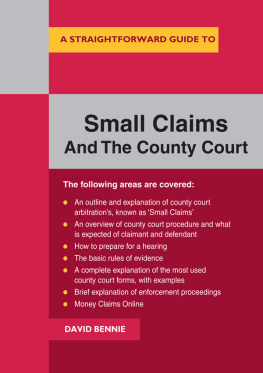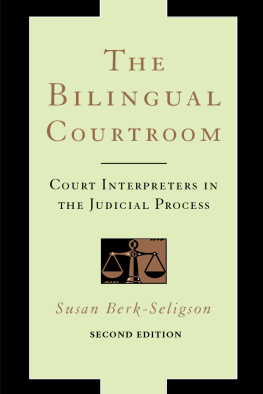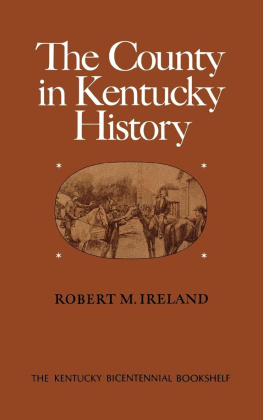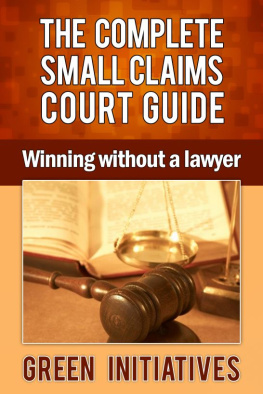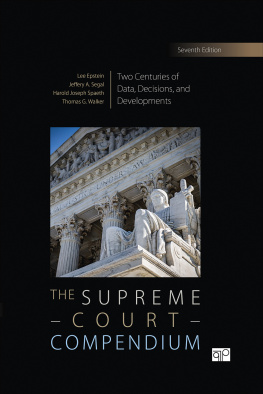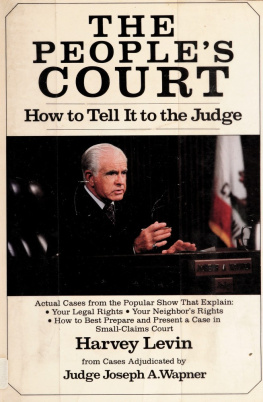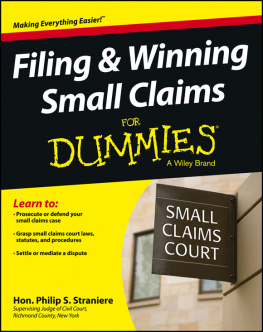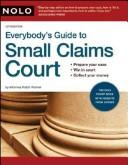Contents
A STRAIGHTFORWARD GUIDE TO SMALL CLAIMS AND THE COUNTY COURT
DAVID BENNIE
Straightforward Guides
www.straightforwardco.co.uk
Straightforward Guides
Straightforward Publishing 2018
All rights reserved. No part of this publication may be reproduced in a retrieval system or transmitted by any means, electronic or mechanical, photocopying or other wise, without the prior permission of the copyright holder.
British Cataloguing in Publication data. A catalogue record is available for this book from the British Library.
ISBN 978-1-84716-784-2 (PDF)
ISBN 978-1-84716-856-6 (ePUB)
ISBN 978-1-84716-859-7 (Kindle)
Printed in the United Kingdom by 4edge www.4edge.co.uk
Cover Design by Straightforward Graphics
Series editor Roger Sproston
Whilst every effort has been made to ensure that the information in this book is accurate at the time of going to print, the author and publisher recognise that the information can become out of date. The book is therefore sold on the understanding that no responsibility for errors and omissions is assumed and no responsibility is held for the information held within.
CONTENTS
Chapter 1.
Introduction to Small Claims and The County Court
The aim of this guide, which is intended to be for the layperson as opposed to the professional, is to explain the procedure by which you can bring or defend a small claim and how to enforce a judgment. This guide is a guide to procedure not a prcis on the law or your rights.
The small claims procedure has evolved over the years, initially limited to claims involving sums in dispute of not more than 100. However, over the years that limit has increased and now stands at 10,000 for money claims (3,000 in Scotland and 3,000 in Northern Ireland). Readers should be aware that, when it comes to claims against local authorities however, you have to apply for a judicial review to the High Court. If you do not, they can apply to strike out and you will have to pay their solicitors costs. Tread carefully here!
This book covers England and Wales and for advice on Scotland the reader should go to www.scotcourts.gov.uk/taking-action/small-claims.
For Northern Ireland www.nidirect.gov.uk/articles/small-claims-process.
Every year, more than 100,000 small claims are commenced in the county court. The Civil Procedure Rules guide small claims and they ensure that a consistent approach to the resolution of small claims is adopted across the board. Prior to 2000, there was no appeal against an award in a small claims court. However, since October of that year there has been a full appeal procedure which is the same as for other cases governed by the Civil Procedure Rules.
Terminology
A definition of legal terms is contained within the glossary of the book. The Civil Procedure Rules created a new terminology for litigation. The person bringing the case is known as the Claimant. Virtually all small claims cases are dealt with by district judges, save for the few that are dealt with by Circuit Judges at the time of an appeal. All county courts will deal with small claims cases and there is no separate building or court called the small claims court. Nearly all hearings are conducted in the normal county court building, usually in a room containing the litigants and the judge. Mediations are held under the auspices of the National Mediation Helpline 0800 246 1218 and are often held in local solicitors offices, the parties homes or offices or some other agreed venue.
Small claims tracks
The three management categories for civil claims in the county court are called tracks.
They are shown overleaf:
Small claims track Part 27
| Cases up to 10,000 in value except:
|
Cases which include a claim for personal injury up to 1,000 in value only |
Housing cases-limited to where the claim against the landlord is for repair/damages no more than 1,000 each |
Fast Track part 28 |
Cases above the small claims limit but of no more than 25,000 in value and where the case can be heard in one day or less.
|
Multi-track part29 | Cases which do not qualify for the small claims or fast track including all cases over 25,000 in value. |
The small claims track provides a simple and informal way of resolving disputes and should enable you to dispense with the services of a lawyer. The amount in dispute should normally be less than 10,000. A person can ask for a claim to be dealt with in the small claims track if the amount is more than 10,000 but the defendant must agree with the suggestion and a judge must be satisfied that the case is simple enough for the small claims track. If the claim for over 10,000 is dealt with in the small claims track then the winner can claim all costs against the losing party. These costs, however, can be no more than those that would have been awarded in the fast track. Normally, the person who wins the case cannot normally recover their solicitors fees from their opponent other than the fixed costs on the issue of the Claim Form, witness and other expenses. Costs are explained in Chapter 15. For allocation to the fast-track the claim will be over 25,000. The fast track is for cases that can be resolved in one day or less. If a judge deems that the case should be allocated to the multi-track, because it is over 25,000 or is too complex this will be communicated to the claimant. If the claim is allocated to the multi-track then advice should be sought from a solicitor. Although you may well be able to present the case in court the amount of preparatory work can be daunting.
With fast and Multi track cases costs can be awarded up to the value of 2/3 of the costs on average.
The court will send you a notice of which track the case has been allocated to. If it has been allocated to the fast-track then form N154 will be sent to you together with instructions as to what you need to do to prepare for trial, called directions. If the claim has been allocated to the multi-track then form N155 will be sent. Standard directions and a typical timetable for a fast track case will be:
Disclosure of documents (followed by inspection) four weeks after allocation
Exchange of witness statements-10 weeks
Exchange of expert reports (where appropriate) -14 weeks
Court send out listing questionnaire -20 weeks
Return questionnaire -22 weeks
Trial around 30 weeks.
For multi-track cases, there is no standard procedure, each case will be managed according to its complexity. A case management conference may be held, where the judge gets together with all the parties to review the progress of the case. Small claims are heard in the county courts by the district judge. The person who is bringing the claim is called the claimant and the person he is making the claim against is known as the defendant. When a hearing has taken place the district judge will reach a decision known as a judgment. This is a court order, which usually requires certain actions such as to pay compensation or damages to the claimant or the claim will be dismissed if the defendant is successful.
*****
Chapter 2.
Types of Small Claim in the County Court
This chapter reviews the types of claim that could fall under the small claims track. Small claims most often result from a breach of contract such as non-payment of an invoice, or breach of express or implied terms, or can result from circumstances where there is no contract like personal injury (known as tort), or for non-payment of a cheque.

